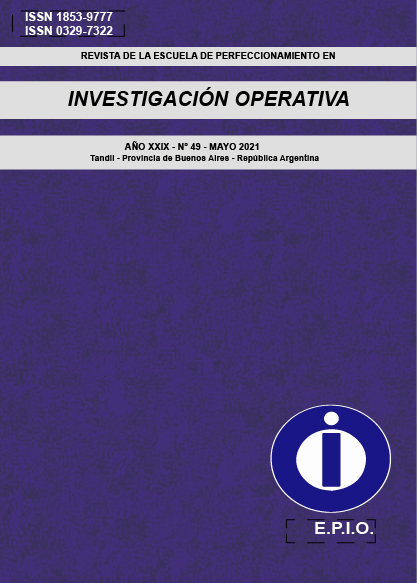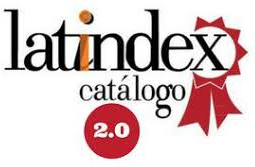El Dilema de la Dualidad Energética: un análisis de funciones energéticas homotéticas a través del enfoque de Teoría de Juegos
Keywords:
energy efficiency, game of theory, energy duality, homothetic functions, energy homothetic, sustainable economic developmentAbstract
For centuries the anthropogenic activities of the industrial sectors have been increasing the levels of global warming on Planet Earth. A public policy approach to the rational and efficient use of energy is essential to extend the energy transition that will allow us to move towards a sustainable humanity.
The Dilemma of Energy Duality raises controversies regarding the genuine effectiveness of an Energy Efficiency Program and the real specific possibilities of energy saving. The analysis of homothetic functions allows establishing an energy saving function and as a complement, a possible energy dissaving function associated.
However, the dynamics of energy duality and its effects on energy saving levels and greenhouse gas emissions do not follow a linear behavior and its impact is conditioned by the elasticity of energy duality.
From this perspective, the mechanisms of Game of Theory provide us with the possibility of approaching energy duality in a context of collective energy reciprocity.
Conclusions show that the effectiveness in the design stage, implementation and control of an energy efficiency program is decisive in maximizing the expected energy performance.
Downloads
References
Aumann y Sorin (1989). Cooperation and Bounded Recall. Games and Economic Behavior, 1 (1), 5-39.
Axelrod y Hamilton (1981). The Evolution of Cooperation. Science, 211 (4489), 1390-1396.
Battigalli y Dufwenberg (2009). Dynamic Psychological Games. Journal of Economic Theory, 144 (1), 1-35.
Bernheim y Drebaj (1989). Collective Dynamic Consistency in Repeated Games. Games and Economic Behavior, 1 (4), 295-326.
Binmore (2011). La Teoría de Juegos. Una breve introducción. Alianza Editorial S.A., Madrid, 2011.
Brandts y Sola (2001). Reference Points and Negative Reciprocity in Simple Sequential Games. Games and Economic Behavior, 36 (2), 138-157.
Camarda (2017). Eficiencia Energética y Competitividad Industrial: Análisis del Sistema de Incentivos en torno al Programa Provincial Energía Eficiente (ProPEE). Revista Administración Pública y Sociedad, N° 3, enero-junio 2017, 62-81.
Camarda (2018). Teoría de Juegos en el campo de la Eficiencia Energética: Análisis de la dinámica industrial en la búsqueda de un Equilibrio de Nash Eficiente. Revista de la Escuela de Perfeccionamiento en Investigación Operativa, Año XXVI, N° 44, noviembre 2018, 41-60.
Camarda (2019). La Institucionalidad de la Eficiencia Energética en la República Argentina: un análisis de las principales políticas en el período 1980-2017. Revista Administración Pública y Sociedad, N° 7, enero-junio 2019, 22-43.
Camera y Casari (2009). Cooperation among strangers under the shadow of the future. American Economic Review, 99 (3), 979-1005.
Camerer (1997). Progress in Behavioral Game Theory. Journal of Economics Perspectives, 11 (4), 167-188.
Carpio y Coviello (2013). Eficiencia Energética en América Latina y el Caribe: avances y desafíos del último quinquenio. Comisión Económica para América Latina y el Caribe (CEPAL), Santiago de Chile, 1-12.
Charness, Frechette y Qin (2007). Endogenous transfer in the Prisoner’s Dilemma Game: an experimental test of cooperation and coordination. Games and Economic Behavior, 60 (2), 287-306.
Consejo Mundial de la Energía (2010). Eficiencia Energética: Una receta Para el éxito. Traducido por el Comité Argentino y el Grupo de Eficiencia Energética del CACME, 1-17.
Dal Bó (2005). Cooperation under the shadow of the future: experimental evidence from infinitely repeated games. American Economic Review, 95 (5), 1591-1604.
Dal Bó y Frechette (2011). The evolution of cooperation in infinitely repeated games: experimental evidence. American Economic Review, 101 (1), 411-429.
Dreber, Fudenberg y Rand (2014). Who cooperates in repeated games: the rol of altruism, inequity aversion, and demographics. Journal of Economic Behavior & Organization, 98, 41-55.
Fudenberg y Levine (2016). ¿Whiter Game Theory? towards a theory of learning in games. Journal of Economics Perspectives, 30 (4), 151 -170.
Fudenberg y Maskin (1986). The folk theorem in repeated games with discounting or with incomplete information. Econometrica, 54 (3), 533-554.
Gibbons (1992). Un primer curso de Teoría de Juegos. Antoni Bosch ed., Barcelona, España.
Gómez, Mathé y Sella Piedrabuena (2013). Eficiencia Energética. En Matriz de recursos energéticos de la provincia de Córdoba, CIECS (Conicet y UNC), Editorial Copiar, ed. Devalis, S. A., 95-129.
Gong y Yang (2019). Cooperation through indirect reciprocity: the impact of higher-order history. Games and Economic Behavior, 118, 316-341.
Hauert y Schuster (1997). Effects of increasing the number of players and memory size in the iterated prisoner’s dilemma: a numerical approach. Proceedings Biological Sciences, 264 (1381), 513-519.
Hilbe, Traulsen y Sigmund (2015). ¿Partners or Rivals? Strategies for the iterated prisoner´s dilemma. Games and Economic Behavior, 92, 41-52.
Hilbe, Wu, Traulsen y Nowak (2014). Cooperation and control in multiplayer social dilemmas. Proceedings of the National Academy of Sciences of the United States of America, 111 (46), 16425-16430.
Laffont y Maskin (1979). On the difficulty of attaining distributional goals with imperfect information about consumers. The Scandinavian Journal of Economics, 81 (2), 227-237.
Le y Boyd (2007). Evolutionary dynamics of the continuous iterated prisoner’s dilemma. Journal of Theoretical Biology, 245 (2), 258-267.
Maldonado (2008). Estudio sobre empresas energointensivas y su posible contribución a Programas de Eficiencia Energética. Serie Recursos Naturales e Infraestructura N° 135, Comisión Económica para América Latina y el Caribe (CEPAL), Santiago de Chile, junio 2008, 1-58.
Maskin (1999). Nash equilibrium and welfare optimality. Review of Economic Studies, 66 (1), 23-38.
Maskin (2008). Mechanism design: how to implement social goals. The American Economic Review, 98 (3), 567-576.
Maskin (2019). Introduction to mechanism design and implementation. Transnational Corporations Review, 11 (1), 1-6.
Materán Sánchez (2018). Eficiencia Energética en refinerías de petróleo. En Revista de Energía de Latinoamérica y el Caribe (ENERLAC), 2 (2), 72-105.
Nowak (2007). Five rules for the evolution of cooperation. Science, 314 (5805), 1560-1563.
Nowak y Sigmund (2005). Evolution of indirect reciprocity. Nature, 437 (7063), 1291-1298.
Organización Latinoamericana de la Energía (OLADE) (2017). Recomendaciones de política para el sector energético de América Latina y el Caribe en apoyo a la implementación de las NDCS. OLADE, 1-84.
Organización Latinoamericana de la Energía (OLADE) (2019). Barómetro de la Energía de América Latina y el Caribe 2019: Energía Renovable y Eficiencia Energética. OLADE, 1-15.
Shubik (1996). Teoría de Juegos en las Ciencias Sociales. Conceptos y Soluciones. Editorial Fondo de Cultura Económica. México, D. F.
Suzuki y Akiyama (2007). Evolution of indirect reciprocity in groups of various sizes and comparison with direct reciprocity. Journal of Theoretical Biology, 245 (3), 539-552.
Zagorsky, Reiter, Chatterjee y Nowak (2013). Forgivers triumphs in alternating Prisoner’s Dilemma. Plos One, 8 (12): e80814.
Published
How to Cite
Issue
Section
License

This work is licensed under a Creative Commons Attribution-NonCommercial-ShareAlike 4.0 International License.
Atribución — Usted debe dar crédito de manera adecuada, brindar un enlace a la licencia, e indicar si se han realizado cambios. Puede hacerlo en cualquier forma razonable, pero no de forma tal que sugiera que usted o su uso tienen el apoyo de la licenciante.
NoComercial — Usted no puede hacer uso del material con propósitos comerciales.
CompartirIgual — Si remezcla, transforma o crea a partir del material, debe distribuir su contribución bajo la misma licencia del original.







